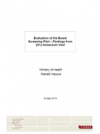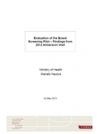This report provides information on the bowel screening pilot from the perspective of those providing services to the pilot.
It details the results of an immersion visit undertaken in September 2012 to gain a detailed understanding of the early implementation of the bowel screening pilot, from those involved with its design, implementation and day-to-day operations.
The report offers a record of the early implementation of the pilot and useful insights into implementation successes and challenges.
It is acknowledged that the findings are limited by the relatively small number of general practices that participated in an interview.
Reflecting the early implementation of the pilot, less focus was placed on the investigation, surveillance and treatment stages of the screening pathway. This will be explored in more detail in the 2013 and 2015 immersion visits.
Focus was instead placed on how the pilot was being implemented and what was working well and not so well. It looked at key process improvements to enhance the pilot, as well as lessons for a national roll-out of a bowel screening programme, should it proceed.
The report notes widespread sector support for the programme, effective leadership and a multi-disciplinary approach to decision making.
Methodology
MethodologyEvaluators from Litmus, Kaipuke Consulting and Integrity Professionals visited WDHB and undertook 62 face-to-face, phone interviews and group discussions with providers across the screening pathway (including representatives from the Ministry of Health, Waitemata District Health Board, LabPLUS, New Zealand Post, Orangebox, Primary Health Organisations and general practices). Fieldwork was undertaken between September and October 2012. All interviews followed an informed consent process.
The findings from the immersion visit offer a record of the early implementation of the BSP and useful insights into implementation successes and challenges. It is acknowledged that the findings are limited by the relatively small number of general practices that participated in an interview. Reflecting the early implementation of the BSP, less focus was placed on the investigation, surveillance and treatment stages of the screening pathway. This will be explored in more detail in the 2013 and 2015 immersion visits.
Key Results
Key findingsOverall, the implementation of the BSP, (while intensive and not without its challenges), has progressed relatively smoothly, demonstrated in the overall participation rate. The factors that have positively contributed to the BSP’s implementation are:
- The BSP Coordination Centre has placed significant effort on developing effective relationships with primary care. In instances where the screening pathway is not working as intended the general practice is promptly contacted by the BSP Clinical Director or the BSP Programme Manager to discuss the issue and rectify for future participants. Primary Health Organisations (PHOs) are also informed of issues arising.
- Given the unique role of general practice in the BSP screening pathway, consideration is needed on whether this level of variation is acceptable. Internationally, GP involvement in bowel screening has been shown to have a positive impact on iFOBT screening participants, although it is noted that like New Zealand this is subject to high variability (Federici et al 2006, Koo et al 2010, Power et al 2009). In this context and acknowledging the limited focus on general practice in this immersion visit, this is an area for further investigation.
- Ensuring adequate workforce capacity. Having adequate colonoscopy capacity to meet quality standards was the challenge identified most frequently in relation to the BSP. At one stage, concerns were raised that there were not enough endoscopists to undertake the ten lists per week needed to ensure BSP participants with a positive iFOBT have their colonoscopy within 50 working days. Through a range of strategies, BSP management was able to recruit enough endoscopists to fill all ten lists, and the 50 day quality standard was not breached.
- Limited endoscopy capacity is a New Zealand–wide issue. GPs are concerned that resource dedicated to bowel screening may be being diverted from symptomatic lists resulting in longer wait times for symptomatic patients.
- Managing incorrectly completed iFOBT kits. An estimated 15% of iFOBT kits are not completed correctly the first time they are returned; mainly due to supporting paperwork being incorrectly completed. These are known as ‘spoilt kits’. Over a three-month period, this reduces to 3% with participants being asked to complete another kit and/or receiving advice and guidance on using the kit. The likelihood of a person returning a spoilt a kit increases with age, and some ethnic groups are more likely to send in incorrectly completed kits. At the time of this report, instructions for the kit were only printed in English (supported by diagrams). This may contribute to the higher rate of spoilt kits in some ethnic groups. Currently, work is underway to simplify the kit instructions with a view to reducing the number of spoilt kits.


